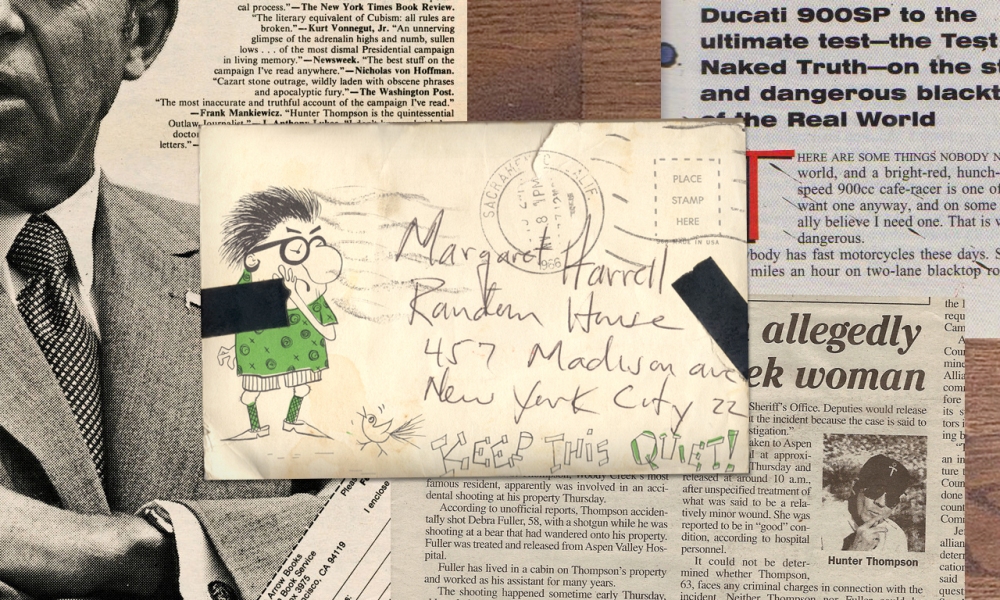
Hunting For Thompson. (Margaret A. Harrell)
Margaret Harrell first met Hunter when she was working on copy editing his first published book Hell’s Angels. They maintained a friendship for years after. She is an accomplished author herself, In-particularly of the Keep This Quiet series where Hunter gets a significant mention. For any and all information on Margaret, and where to buy her books you’ll find her site here. Many thanks to Margaret for taking the time to do this. Also I must thank her for her constant advice, pushes, kicks and inspiration.
Margaret A. Harrell on the separation of Hunter & Duke.
I would never attempt to try to figure Hunter out. But he did spontaneously bring up the subject of Duke to me once. It was after we’d not spoken for many years, and suddenly we fell back into talking frequently for hours (on the phone). It was as if we’d never stopped. However, it had been over fifteen years since we last spoke—years of experience that neither of us knew the other had had. I lived in Belgium (before that Morocco), and though Hunter was a worldwide phenomenon, I couldn’t follow his career as well as if I’d been in the US. Anyway, following his career would not have given me all the answers. On the flip side, a lot had happened to me he knew nothing about. So in trying to broach the details of the interim, I mentioned some inner experiences in guided meditation. Before I got very far, he said, “Margaret, you talk the craziest of anyone I knew.” This was astounding. Me? Crazier than him? What did he mean? I protested, “I’m not crazier than you.” “No,” he agreed quickly. “But you talk crazier.” It was then he explained about Duke, how he’d invented him so that he, Hunter Thompson, could observe. Many authors spend a lot of time observing, but Hunter threw himself into his stories. He was action personified, driving the scenes. So how and when could he be observing? That was easy. Duke could say things that would get Hunter into trouble. And it was up to the reader to figure out how closely that reflected the author. Meanwhile, a part of Hunter could take it all in.
The conversation I reference above took place in 1991. I go into it in the second volume of my memoir, Keep This Quiet! In fact, it’s at the very conclusion—in a kind of climax. Not so long after that conversation Hunter wrote “Fear and Loathing in Elko”—a perfect illustration— Rolling Stone #622, January 1992. The piece is signed by Hunter and begins with a letter by him. But it switches immediately to a plea by the brute Raoul Duke, at the Sports Desk: “I need your help, Doc. They’re trying to bust me on Sex charges. The snake has come out of the bag, and soon they’ll be after you.” Let me stop a moment. This is the first time I notice that he mentioned the snake coming out of the bag. I don’t think it’s an idle comment. Duke is talking about the snake in the box I kept for Hunter (though maybe it was for Duke) in my Random House office—which escaped. But that’s another story.
Just as the police, unable to find the snake at Random House after it escaped, told me to post a sign in the bathrooms, warning of its possible exit there, so here in “Elko,” Hunter fears the memo by Duke will turn up in the Men’s and Women’s washrooms—in this case, taped on the walls.
“And speaking of crazy,” he says, “take a look at this riff on the Judge and Sexual Harassment I received yesterday” from Duke, who “must have been drunk when he wrote this.”
Besides a reference to Duke almost tweaking a secretary’s nipples, which HST himself had been accused of, it appears that—even if this information makes sense only to me—Hunter is associating his alter ego’s memo with the snake he in fact, years earlier, had had put on a flight to New York City from the Florida swamps to join him, with the intention to continue on together to Owl Farm; it got slaughtered instead: chopped dead right on the Random House stairs. It was a free spirit, a roaming embodiment of nature and the Life Force, which sent shock waves and fears into the mind of a night watchman, who killed it. According to his editor Jim Silberman, Hunter spoke to Jim about that snake at least once a year afterwards, this being one of those instances though veiled.
It’s not very far-fetched to think of Hunter describing his alter ego’s writing in terms of the snake in the city—a wild, loose spirit whose very existence might be grounds for its murder on the spot, as snakes can’t be jailed. No, murder it. I just never made the association before, though I occasionally wondered if it might symbolize anything, then what? Now Hunter has answered the question, as he keeps answering questions from over there, wherever he is. Hunter also called this alter ego a wizard, Bobo, and other pet names. “Bobo” was the name he used to sign my mother’s copy of Hell’s Angels with an outrageous comment attached. Further, it comes to mind, Hunter wondered at a fairly young age whether a writer imposed himself on reality by writing (like Faulkner) or by acting, then writing. Well, Raoul Duke acted and Doc took things down in observation and inner rumination, with a smile playing on his lips as if he knew something.
Faulkner was not a talker. He was known for a “wall of silence,” in which he observed. By contrast, Faulkner’s brother, who also wrote, was a talker and less of a writer. I don’t think of Hunter as a chatty talker. In fact, some of what I remember most was his looks, often internalized. That was Hunter, while Duke was the perfect foil.
Taking this crazy analogy a little further, if the snake I kept briefly for him in my office represented the irrepressible Raoul Duke’s writing, then I knew Duke well. It was thrilling and adrenalin-sparking to have the snake around that scant amount of time. It liked to poke its head, unthinkingly, in electricity sockets. Yes, that would be Duke. Keen on electricity, not thinking about the danger. Yes, I can see it now. But then, what did the peacocks Hunter kept at his ranch represent to him? The Dobermans are easy. But the peacocks?
Hunter was fun, and I am having fun imagining here, which brings me closer to him. He might not have gone along with the analogy. But Duke did. He said so. In “Fear and Loathing in Elko” just a few months after I last saw him.

[…] thanks to Marty Flynn, owner of HST Books, who has added this post. I have reproduced the beginning below. But I am sure you will want to click “Keep […]
Bravo Marty! Once more unto the breech. It’s pleasing to see that you are following the advice
of Betty Fraud and saying “I know” to Anhedonia.
savagehenry101
The battle rages. I won’t abide. Drop me a line should the mood allow.